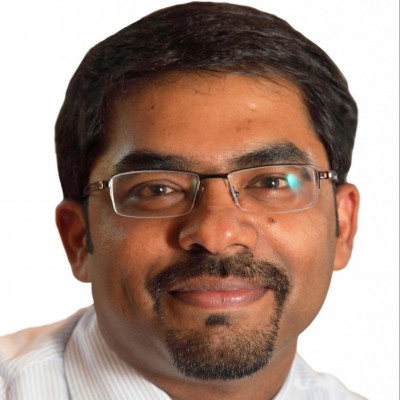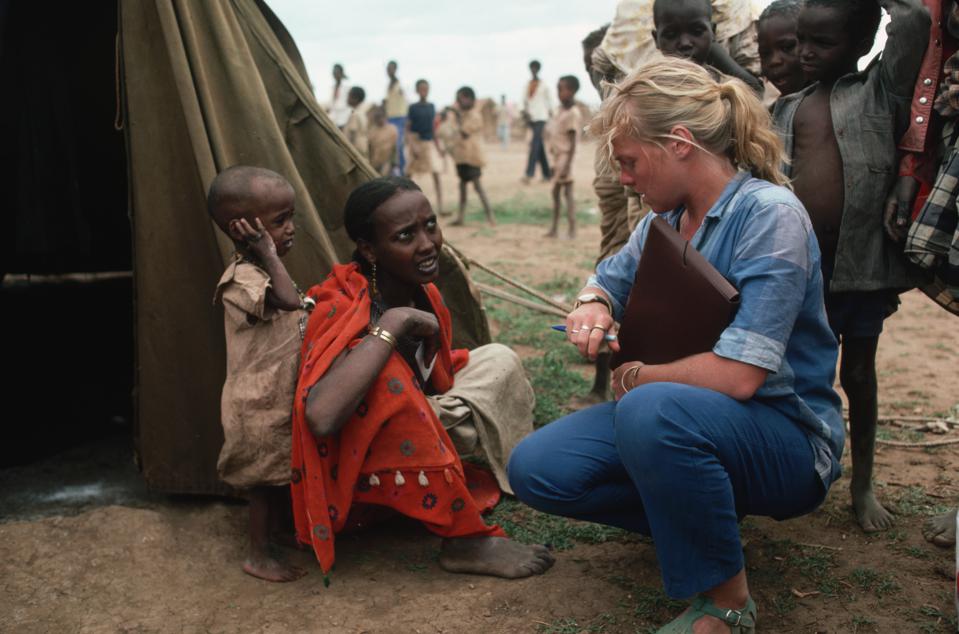
 I write about global health, infectious diseases, and equity
I write about global health, infectious diseases, and equity
I am a Canada Research Chair of Epidemiology & Global Health at McGill University, Montreal, where I serve as Associate Director of the McGill International Tuberculosis Centre. I did my medical training in India and public health training in Berkeley. My research is mainly focused on improving the diagnosis and treatment of tuberculosis in low and middle income countries. I like to write about global health, technologies of relevance to global health, healthcare delivery challenges in low income countries, and inequities in healthcare. I serve as an adviser to non-profits such as WHO, Stop TB Partnership, FIND, and TB Alliance. I have written for HuffPost, The Conversation, STAT, Devex, Scientific American, Nature blogs, among others. Follow me on Twitter @paimadhu

Uganda, World Map At Nile River Deck. (Photo by: Hermes Images/AGF/Universal Images Group via Getty ... [+] Universal Images Group via Getty Images
In theory, global health, as a field, takes pride in principles such as equity, reciprocity, and bidirectional partnerships. In fact, these principles are used to separate ‘global health’ from its previous iterations (e.g. ‘international health’ and ‘tropical’ & ‘colonial medicine’).
In practice, every aspect of global health is dominated by individuals and institutions in high-income countries (HICs) who benefit more than their counterparts in low- and middle-income countries (LMICs). So, equity remains elusive.
What about reciprocity and bidirectional partnerships? In this first of a two-part series, I intend to explore this important issue. The first part will address the challenges for reciprocity, and the second part will outline potential solutions.
Is global health truly reciprocal?
Every year, large numbers of HIC trainees and researchers visit LMICs to engage in global health missions, clinical tourism, research and consultancy work. Reciprocity would require HIC institutions, in return, to host LMIC trainees and experts. Is this happening? I asked a few LMIC experts.
Fredros Okumu, Director of Science, Ifakara Health Institute in Tanzania replied: “Global health is heavily biased in favor of European and North American researchers and students. Its fashionable for these pseudo-experts to set off on a ‘go save lives in Africa’ mission. They get visa on arrival, princely treatment by locals, and a right to call themselves ‘Africa Experts’. An African or Indian student, on the other hand, must open their nakedness to even get a visa, sometime having to travel to a separate country to even secure a visa interview. No equivalent hospitality upon arrival and such poor pay that they cannot afford to bring their family.”
It’s Time To Use Covid-19 Innovations And Systems To Reimagine TB Care
How Prestige Journals Remain Elite, Exclusive And Exclusionary
Ebola, Covid-19 And The Elusive Quest For Global Health Equity
“No, I don’t think global health as currently practiced is truly reciprocal,” said Celestina Obiekea, a senior scientist at the Nigeria Center for Disease Control. “There’s still the feeling that HIC folks are the ones who have the knowledge to ‘give’ while the LMIC people ‘receive’, she added.
“Global health is not reciprocal at all though several organisations are trying,” said Yap Boum, a researcher at Epicentre, Médecins Sans Frontières, Cameroon. “You have 10 US-based students hosted in an African University for 1 African going there, which is definitely unfair. However can we totally blame them? Donors must understand this reciprocity and ensure that for one HIC student going to LMICs one student should go to the HIC under the same funding mechanism.” he added.
What does research show?
There are studies on reciprocity and partnerships in global health. Although they report benefit and value for both parties, one survey found inequities in one-sided provision of funding, lack of bidirectional student exchange, and in publication authorship. Another survey of inter-university partnerships concluded that “many partnerships violated the principle of equivalence, as exchanges were often not equal based on tangible benefits realized. Only when intangible benefits, like values, were considered was equivalence realized.” It appears that North American institutions are more positive than their LMIC partners in their assessments of benefits, both for themselves and their international partners.
Very few HIC agencies or universities report ratios on numbers of HIC trainees who visit LMICs, vis-a-vis LMIC trainees hosted in HICs. According to one estimate, approximately 30% of US medical school graduates have participated in a global health experience. One study found that, “although the majority of US institutions with structured global health programs sending students to sites abroad accept international students at their sites in the US, nearly one-fifth of programs do not offer such opportunities for bidirectional exchange.”
Indeed, medical educators in the US have called for a “move away from merely sending learners to international partner sites and instead become true global health partners offering equitable educational experiences.”
Noelle Sullivan is a medical anthropology professor at Northwestern University who studies voluntourism. “I don’t think for the most part it is reciprocal, and even when it is it’s often quite problematic in that knowledge transfer is seen as a one-way affair (from so-called global North institutional experts to LMIC’s but not vice versa). I think that’s a real problem and there’s been an active erasure of the innovations that researchers from LMICs have contributed, or often their contributions have been buried under the name of someone HIC-affiliated,” she added.

Physician Treating Ethiopian Refugees (Photo by Peter Turnley/Corbis/VCG via Getty Images) Corbis/VCG via Getty Images
Why is reciprocity such a challenge?
As the director of global health at a HIC university, my team and I have faced challenges in ensuring reciprocity. First, HICs have huge visa restrictions and entry barriers. Even when we invite LMIC experts and offer to pay for their visits, they struggle to get visas and often pay a lot for them. Visa denials can be traumatic. I know this from personal experience.
How reciprocal can HIC institutions be, if their own governments are not supportive? The Trump travel ban, and Brexit pose huge problems for reciprocity by institutions in these countries.
Second, HIC universities and donors are keen to support local students who travel, but less keen on the funds being used for LMIC trainees. Thus, most travel awards and fellowships are restricted to HIC citizens or permanent residents.
Third, major global health funders provide grants to HIC institutions, with generous overheads. For example, the Fogarty International Center (FIC) within NIH is a major funder. More than 80% of Fogarty's approximately $54 million extramural grant making budget goes to U.S. institutions to support scientists' salaries and other costs. LMIC institutions typically receive smaller budgets with lower overheads. They have limited leverage and cannot insist on reciprocity.
Despite this limitation, over 6,000 scientists worldwide have received significant research training through FIC. My doctoral training at Berkeley was funded by a Fogarty program. This fellowship changed my life. Many talented people in LMICs do not get such breaks.
Fourth, it is not easy for LMIC trainees to get accepted into graduate programs in HICs. Even if they bring considerable research and lived experience, they still need to demonstrate high scores (e.g. GPA, GRE, TOEFL, USMLE). These scores are expensive to obtain, and tend to exclude non-English speaking candidates.
“We think, because we come from a HIC, that we are entitled to go anywhere in an LMIC. We are asked nothing, not even our medical license or diploma. In contrast, people from LMIC do not think they belong at the table in global health. To change this, we need to work harder and convince LMIC folks that they can come as well, and they are as entitled as any HIC person. They need to believe that they can also do it.”
Fifth, even if the admission hurdle is overcome, fewer faculty in HIC institutions agree to supervise international students, since tuition fees are much higher for international students. I was lucky, and had professors who took a chance on me.
Sixth, HIC institutions and funders have an anxiety about contributing to the 'brain drain' problem. However, most Fogarty trainees return to their countries to assume leadership positions.
Seventh, medical & allied health professionals from LMICs are generally not allowed to train in hospitals in HICs, since their training is not deemed valid or equivalent. Even highly qualified, experienced LMIC medical specialists face huge barriers for medical licensure. In contrast, HIC doctors practically never face licensure challenges in LMICs.
Eighth, HIC professors easily get visiting professorship appointments in LMIC institutions. HIC institutions rarely reciprocate.
Ninth, while HIC students can often fund their own travel to LMICs, LMIC students find this impossible. Their own institutions rarely offer them funding for travel. So, they entirely depend on external funds or HIC partners for travel support.
Tenth, within LMIC institutions, there is often a 'hierarchy' with senior researchers and directors getting invitations and travel support. Junior faculty and trainees are not prioritized for exchanges.
These challenges are not trivial, but they can and must be overcome. Otherwise, global health will continue to remain a one-way street. My next post will cover potential solutions. Suggestions are welcome!
Note: Part 2 of this series was published on 6 March.
Poster un Commentaire